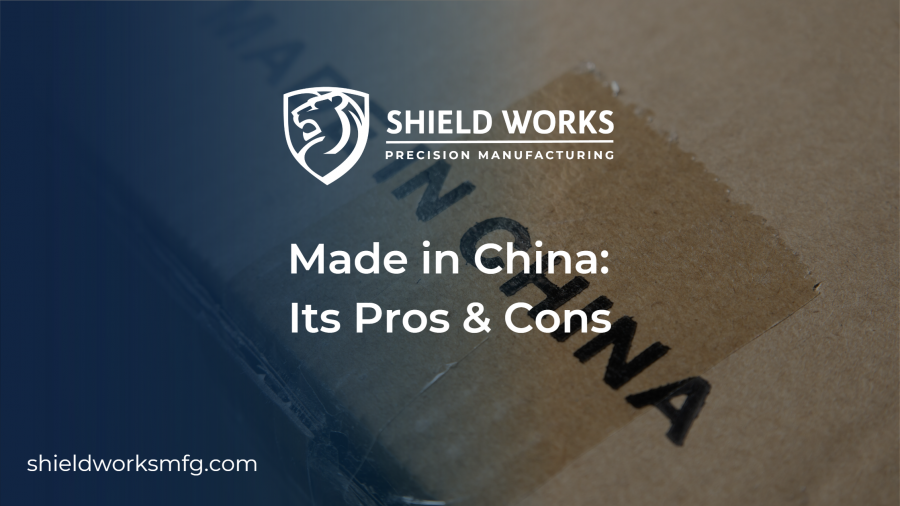Made in China: Its Pros & Cons

If you have ever purchased a product, it is quite likely that it was made in China. China is the world’s largest exporter and has been manufacturing products for decades. The country’s lower labor costs and large workforce have made it a top destination for businesses looking to pursue higher cost-effectiveness, against all odds.
While there are many benefits to products made in China, there are also drawbacks that you should consider. In this article, we will explore the pros and cons of manufacturing in China.
Pros
Cost Savings
One of the most significant benefits of manufacturing in China is cost savings.
Labor costs in China are lower compared to many other countries, which allows businesses to save on labor costs and invest in other areas of the business such as research and development, marketing, or expanding their product line.
This cost savings can give businesses a competitive edge in the market and allow them to offer products at a lower price point.
Wide Range of Products
China is known for its diverse manufacturing industry that can meet the needs of many businesses. From clothing and electronics to furniture and toys, businesses have access to a wide range of products to sell.
This diversity allows businesses to find suppliers for their specific needs and gives them more options to choose from.
Additionally, Chinese manufacturers have experience in producing large volumes of goods, which can be a significant benefit for businesses looking to scale their operations.
Established Supply Chain
Another benefit of manufacturing in China is the established supply chain.
The country has a well-developed infrastructure that allows for efficient transportation of goods and materials. Additionally, there are many suppliers and manufacturers in China that businesses can work with, making it easier to find the right partner for their needs.
This established supply chain helps businesses reduce costs, increase efficiency, and improve the speed of delivery.
Improved Quality Control
China has made significant improvements in quality control in recent years.
Many manufacturers have invested in new technologies and processes to improve the quality of their products.
This can be a significant benefit for businesses that want to ensure that their products meet high standards. Improved quality control can help businesses reduce costs associated with returns, refunds, and negative customer feedback.
Scalability
Chinese manufacturers have the ability to rapidly scale up production to meet increased demand.
This is due to the country’s large and highly skilled workforce, as well as the advanced technology and equipment that many manufacturers possess.
For businesses looking to expand their product offerings or enter new markets, manufacturing in China can offer the scalability needed to meet growing demand without sacrificing quality or increasing costs.
Additionally, Chinese manufacturers can often provide customized solutions for businesses looking to create new products or modify existing ones to better suit their needs.
Cons
Labor Laws and Working Conditions
China has faced criticism for its labor laws and working conditions in some factories. Reports of long working hours, low wages, and poor working conditions have raised concerns about worker exploitation.
This can be a reputational risk for businesses that partner with manufacturers that have poor labor practices.
Businesses need to conduct proper due diligence to ensure they are working with manufacturers that adhere to local labor laws and have safe working conditions for their employees.
Additionally, businesses can prioritize partnerships with manufacturers that have certifications for ethical labor practices to demonstrate their commitment to social responsibility.
Intellectual Property Theft
Intellectual property theft is a significant concern for businesses that manufacture in China.
There have been many cases of companies having their designs or technology stolen by Chinese manufacturers, which can be a significant threat to a business’s competitiveness.
Businesses need to have proper legal protections in place, such as trademarks and patents, and work with trusted manufacturers to mitigate this risk.
Language and Cultural Barriers
Doing business in China can be challenging due to language and cultural barriers. Many Chinese manufacturers and suppliers do not speak English fluently, which can make communication difficult.
Additionally, there may be cultural differences that can impact business relationships and negotiations. Businesses need to have a clear understanding of cultural differences and have bilingual staff or translators to help bridge the communication gap.
Environmental Concerns
China has been criticized for its environmental practices, with many factories emitting pollutants and contributing to air and water pollution.
This can be a concern for businesses that are committed to environmental sustainability. Businesses need to conduct proper due diligence to ensure they are working with manufacturers that have proper environmental practices in place.
Geopolitical Risks
Finally there are geopolitical risks associated with manufacturing in China. The country’s relationship with the United States and other countries can impact trade policies, tariffs, and regulations.
This can create uncertainty for businesses that rely on stable trade relationships. Additionally, political unrest or changes in the government can create instability in the country, which can impact business operations.
Overall, manufacturing in China is still a very viable option for businesses, but it’s important to weigh the pros and cons carefully and take necessary precautions to mitigate risks. By doing so, businesses can take advantage of the benefits of manufacturing in China while protecting themselves from potential drawbacks.
Or you can consider working with a manufacturer that can help you reap the many benefits of the developed manufacturing in China while perfectly dodging its side-effects. Shield Works is one of them, priding itself on the 18 years of operation, international team of design and development, in-house assembly facility and vast suppler networks in Asia. Contact us now!
